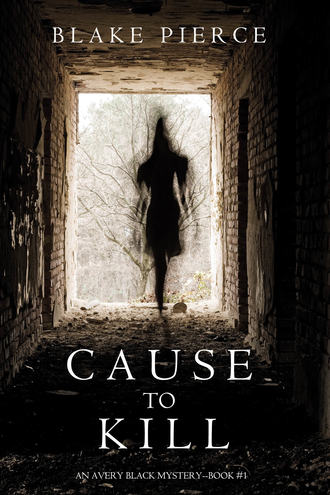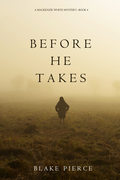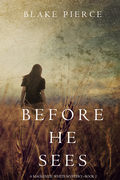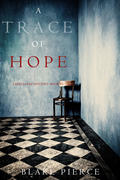
Блейк Пирс
Cause to Kill
CHAPTER SIXTEEN
The police department stood on their feet when Avery and Finley appeared from the elevator banks. Finley basked in the attention. He bowed, hooted at his friends, and repeatedly yelled: “I’m the man, right? You see how we do it on the South Side?”
“Great job.” People clapped.
“You got him!”
In a dark place, Avery heard none of it. The office was a shell with no one inside, the sounds: white noise. Images swirled in her mind: George Fine, Winston Graves, and the old dead man in his sick, twisted basement of horrors.
O’Malley came out of his office to personally shake Avery’s hand.
“Talk to me,” he said. “How did it go?”
“Guy’s name is Larry Kapalnapick. Works at Home Depot as a loader,” Avery said. “From the looks of it, all the bodies in the basement were already dead.”
“Fuckin’ grave digger!” Finley chimed in.
“He must have been doing it for years,” Avery said. “Watertown police estimated there were body parts from at least twenty different people down there. Best guess is, he digs up a body, plays around for a while, and then cuts it up and stores it in the basement. Henley’s department is having everything shipped to the lab just to make sure.”
“Son of a bitch,” O’Malley whispered.
Finley laughed.
“Motherfucker had Pine Scents hanging all over the basement ceiling.”
“What about our victim?”
“We went back to the scene after the chase. Coroner was there and forensics. Randy says it was the same perpetrator as Cindy Jenkins, same MO, and from the smell of it, probably the same anesthetic. She’ll check into that here.”
“So, Fine isn’t our guy.”
“Can’t be,” she said. “He was locked up tight the night before. He’s guilty of something. But not this. As a precaution, I asked Thompson and Jones to check out the cabin in Quincy Bay. Then Jones will continue street surveillance for the minivan, and Thompson has been assigned to dig up everything he can on Winston Graves.”
“Graves? Jenkins’ boyfriend.”
“It’s a long shot,” Avery admitted. “In the meantime, Finley takes over on the Tabitha Mitchell case. He can start now with friends and family.”
“Finley?”
“He worked his ass off today.”
To Finley she added: “Remember to think beyond Tabitha Mitchell. We need any connections between her and Cindy Jenkins. Childhood history. College majors. Favorite foods. After-school activities. Friends and family. Anything.”
With a fire in his eyes, Finley banged on his heart.
“I’m your pit bull,” he said.
The captain nodded at her.
“What are you going to do?”
Avery imagined the blue minivan heading west from Boston. She believed the killer had to reside in one of the counties that followed: Cambridge, Watertown, or Belmont. The combined populations of those counties totaled almost two hundred thousand. An endless sea of faces.
“I need to think,” she said.
* * *
Avery sited her Glock 27 at a distant target. Orange goggles covered her eyes. Plugs had been stuffed into her ears. She imagined the face of Howard Randall as a placeholder for the new, faceless killer. She fired.
Pop! Pop! Pop!
Three shots hit the target almost dead center.
Thinking had always been her strong suit: time away from a case when she could decompress and process what she knew.
A blank wall greeted her this time.
No leads. No connections. Just a wall that kept her away from the truth. Avery had never believed walls. Walls were for other people, other attorneys, other cops that simply didn’t know how to break through those walls and see what others couldn’t.
What am I missing?
Pop! Pop! Pop!
Her bullets faded to the right. At the start of her session, she’d hit nothing but bull’s eyes. Now they were off. Just like you, she thought. Off. Missing the target. Missing something.
No, she mentally rallied.
Breathe in…breathe out…
Pop! Pop! Pop!
All bull’s eyes.
Howard Randall, she thought.
Suddenly, she realized: That’s it. A fresh perspective.
Stupid, she thought. Crazy. Connelly would go nuts. The media would have a field day. Fuck the media. Would he even do it? Of course he would; she knew for certain. He went to jail for you. He has this sick fascination about you. He’s probably following the case already. No, she swore. I won’t do it. I won’t go down that road again.
She put in a fresh clip in her gun.
She fired.
Pop! Pop! Pop!
Every shot went wide.
* * *
In the darkness of the police station, well past midnight, Avery sat hunched over her desk. Pictures lay spread out before her: Cindy Jenkins, Tabitha Mitchell, Lederman Park, the cemetery, and the alleyway and screenshots of the minivan and the killer.
What am I missing?
Photos were meticulously analyzed.
Finley had already taken a few sworn statements. From the early looks of it, Tabitha had been abducted right out in the open, just like Cindy, probably only steps away from the bar she visited every Tuesday night. Only, there was no boyfriend or frequent stalker to question. According to those interviewed, Tabitha had been single for a while. Tabitha was in a sorority – Sigma Kappa – but the connections to Cindy Jenkins ended there. Tabitha was a junior economics major. Cindy was a senior in accounting.
Sororities.
Is that the link?
She made a mental note to check nationwide sorority gatherings.
The movie playing at the Omni was about three women. The gravestone pointed to three women. Does that mean he kills in threes? The movie and the WWII tombstone girls were compared and contrasted for any leads.
She surveyed multiple car routes around Cambridge and Watertown and imagined where the killer might live, and why he might have chosen those routes. The list of dark blue Chryslers was now being supervised by Finley. They already had two thousand listed with owners for cars made and sold in the past five years. What if he bought it six years ago? she thought. Or seven?
Howard Randall continued to invade her thoughts. She even imagined she heard his voice: “You can come to me, Avery. I won’t bite. Ask me your questions. Let me help you. I’ve always wanted to help.”
She banged on her head.
“Go away!”
Still, the image came, and laughed.
CHAPTER SEVENTEEN
At seven-thirty the next morning, Avery sat in her car a half block down from the home of Constance and Donald Prince.
They lived in Somerville, just northeast of Cambridge, in a small yellow house with white trim on a quiet suburban street. A white picket fence surrounded the property. There were two porches: one on the first floor up, and another on the second level, where chairs and a table had been set for sunlit morning breakfasts.
The scene appeared to be the perfect setting: trees lined the sidewalks, the sun was coming up, and birds chirped in the sky.
Screams were all Avery could remember, the endless screams from the one and only time she had visited the Princes, and tears and plates being thrown against the wall as both of them had desperately tried to drive her away.
Constance and Donald Prince were the parents of Jenna Prince, the last Harvard student killed by Professor Howard Randall, nearly four years ago. The murder had come only weeks after superstar defense attorney Avery Black had done the impossible and gotten Professor Randall off for the murder of two other Harvard students, despite the overwhelming circumstantial evidence stacked against him.
Those brief few days between Avery’s jury win and the killing of Jenna Prince resounded in Avery’s mind. At the jury verdict, the celebration had begun. Nights were spent downing expensive bottles of wine and sharing her bed with numerous, nameless faces. One night in particular, she’d even called her ex to ask if he wanted to get back together again. She never even waited for a response. Avery had just laughed after her question and swore she’d never be with a loser like him again. The shame she felt over that moment continued to burn on her cheeks even now, years later.
Her victory had been short-lived.
She learned the truth from the papers a few days later: “Freed Harvard Killer Strikes Again.” Like his previous victims, the many body parts of Jenna Prince had been carefully reconfigured near Harvard landmarks. But unlike the other murders, this time, Howard Randall had immediately stepped forward. He appeared in Harvard Yard almost as soon as the body was discovered, hands up in surrender and covered in blood. “This is for you, Avery Black,” he had told reporters. “This is for your freedom.”
And her belief that she was a decent, honorable person? That she’d finally done good and freed an innocent man?
Gone.
Everything she believed in was destroyed. Her husband had always known the truth about her faulty overconfidence and ego, but her daughter? It was a shocking revelation. “Was it all about the money?” Rose had wondered. “You set a serial killer free. How many other murderers have you let off so you could wear those shoes?”
Avery glanced at the tan interior of her BMW.
The leather was faded and old. The black dashboard had been removed and updated with her transreceiver, police scanner, and a computer for when she was on stakeouts. The car, bought at the height of her arrogance and fame, now served as a memory of her indulgent past, and a testament to her future.
“You won’t die in vain,” she swore to the memory of Jenna Prince. “I promise.”
The walk to the house felt like forever. The sound of her shoes on the cement, birds, distant cars, and noises all made her more aware of herself, and what she intended to do. “I hate you,” Constance had spit all those years ago. “You’re the devil. You’re worse than the devil.” “Get out of our house!” Donald had cried. “You already killed our daughter. What more do you want? Forgiveness? Who can ever forgive someone as sick and depraved as you?”
Avery walked up the steps.
A phone call would have been inappropriate, even more so than an impromptu visit. They needed to see her face, her desperation. And she needed them.
She rang the doorbell.
A middle-aged female voice cried out: “Who is it?”
Footsteps moved closer.
The door opened.
Constance Prince was white, with an unnatural tan and cropped, bleached-blond hair. Although she rarely left the house except for chores or Mahjong with friends, she had on a mask of heavy make-up: blush, eyeliner, and red lipstick. Wrinkles lined her mouth and eyes. She wore a light sweater and red slacks. Golden bracelets clinked on her wrists. Jewels hung from golden threads on both ears.
A few blinks and she seemed to focus in on Avery. The welcoming air of her posture and appearance quickly faded. A breath was sucked in and she stepped back as if in shock.
Another voice called out.
“Who is it, honey?”
Without a word, Constance tried to shut the door.
“Please,” Avery said. “I just need to ask a favor. I’ll be gone before you know it.”
A sliver of Constance’s face could be seen between the door and frame. Head low, she stood unmoving for a moment.
“Please,” Avery begged. “I need something, but I can’t do it without your approval.”
“What do you want?” Constance whispered.
Avery searched the porch and street before she turned back to the door.
“Have you read the papers?”
“Yes.”
“There’s another killer on the loose. He’s a lot like, the last one,” Avery said without mentioning Howard Randall, “smart and hard to track. Another body was found, today. That makes two so far, but he might work in threes, which means another body isn’t far off. I’m a cop now,” she added. “That life, who I was back then, that’s not who I am now. I’m trying to make amends. I’m trying to be different.”
The door opened.
Donald Prince had replaced his wife. Older, extremely large and out of shape, he had short gray hair, reddish skin, and a look that spoke to his shock and fury. He wore a dirty T-shirt, shorts, and green clogs. A dirt-covered glove was over one of his hands.
“What the hell do you want?” he said. “Why are you here?” He looked down the street. “You’re not welcome in this house. Haven’t you done enough to our family?”
“I came to get your permission,” she said.
“Permission?” he spit and almost laughed. “You don’t need our permission for anything. We want you out of our lives! You killed our daughter. Don’t you understand that?”
“I never killed your daughter.”
His eyes widened.
“You think that excuses what you did?”
“What I did was wrong,” she said, “and I have to live with that – every day. I’m different now. I’m a cop. I try to right these wrongs, not allow them to go free.”
“Well, good for you.” He aggressively nodded. “Too little, too late for us, though. Isn’t it?”
He tried to close the door.
“Wait,” Avery said.
She held a palm on the painted wood.
“There’s a new killer. Just like Howard Randall. Right in our backyard. He’ll kill again. I’m sure of it. And soon. My leads are cold. I need a fresh perspective. I need to go visit Howard, see if he can help. I want your permission.”
A laugh came from inside.
The door opened.
Donald leaned back, impervious.
“You want my permission?” he said. “To talk to the killer of my daughter, so you can stop another killer?”
“That’s right.”
“Sure,” he said with a fake smile. “Good luck.”
Any familiarity left his face, and a dark, murderous glare penetrated Avery.
“I don’t care who you are now. You hear me? You come to my house again? You talk to my wife?” Violence burned in his eyes. His voice turned into a whisper. “I’ll kill you,” he swore. “And that will be justice. True justice.”
CHAPTER EIGHTEEN
South Bay House of Corrections was a tremendous brown complex that spanned over six square blocks in the South End of Boston. The fortress was laid out in the shape of a triangle, with few windows and even fewer ways to enter. Multiple smaller buildings, high walls, and endless gates around the property made its entrance an enigma to the average visitor.
Avery had been to South Bay a few times before, both as an attorney and a cop. Even though it was easy for her to navigate Massachusetts Avenue to the number of side streets that needed to be utilized in order to park on Bradson Street and gain access to the main building, it was always a time-consuming and overly complicated process.
Visitors normally had to give written permission to enter at least a day in advance. If no advanced warning was given, they were usually turned away at the door for security reasons, regardless of their name, position, or excuse. The fact that Avery was a cop meant little to the overseers at South Bay. Prisons were like private islands, states unto themselves where employees were only accountable to their warden and the major.
Avery, however, wasn’t a typical visitor.
A pseudo-celebrity at South Bay, she was known by nearly everyone on staff. The trial where she had Howard Randall acquitted of murder had been televised. What had also been televised was his bloody surrender only days later. During both ordeals, her face had been plastered everywhere, and until her disappearance and eventual reemergence in the Boston PD, her name had become synonymous with corrupt lawyers and a legal system in need of a massive overhaul.
At the metal detector, a guard shouted.
“Hey, Ms. Black. Check it out, Joey! Look who’s here. Avery Black is back.”
“What’s up, Ms. Black?”
Avery offered a limp wave.
“Hi, guys.”
She placed her items on the table and moved through the scanner.
Another guard bowed.
“To what do we owe this honor, Ms. Black?”
“I’m here to see Howard Randall.”
“Oh!” a bunch of guards cooed.
“Wish I was a fly on that wall,” someone said. “Careful, Black. Randall got moved to B-Block two months ago. He carved up an inmate pretty-bad. That old man can move!”
After the metal detectors, she was frisked and allowed to move into the visitors’ room.
“Name?” said a chubby, dour woman inside a gated office.
“Avery Black. Homicide. Boston PD.”
“I don’t see you on our list, Black. You’ll have to come back another time.”
A passing guard made a face.
“Nah, nah,” he said, “let her through. Do you know who this is? Avery Black. Got that crazy old geezer Randall off for murder. Most riveting case I ever watched.”
“You’ll take the heat?”
“Yeah, yeah. Give her a pass. I’ll get someone down to Randall. See if he’s up for a chat. Sorry, Ms. Black, but if Randall don’t want to see you, there’s nothing we can do.”
“Understood,” she said.
The caged waiting room was large and painted green. Buzzers continually resounded beyond the gates, along with slamming doors. Multiple tables and chairs were occupied by visitors waiting for their chance to see loved ones. A Mexican couple was fighting while their three children ran around and tried to talk to others.
What am I doing here? Avery wondered.
“Black! It’s your lucky day,” the guard called. “Randall said he’s been expecting you. No public visiting room, though. He’s got to stay caged. The moment he opens his mouth, he gets in trouble. I’ll walk you downstairs and set you up outside his cell. More privacy for you too, right? And besides, you were his attorney once. Don’t you have lawyer-client privileges?”
The walk down to the basement was everything Avery remembered.
Prisoners cried out and clanked on their cells. “Get me out of here! I’m innocent!” Guards screamed. “Shut or it’s in the Box!” Whispers reached her, from passing guards to prisoners alike. “Hey, sweet thing. You want a private?”
The basement level was darker than the rest of the prison, with poor lighting and thick black doors against gray-painted concrete. White numbers were painted on each door. B1…B2…B3. The guard passed by every door and opened another gate.
“We put him in the conference room for you,” he said. “You should be more comfortable there. When you’re done just yell out.”
One unmarked black door among many was opened.
Howard Randall sat at one end of a long metal table in an extremely narrow room. He had a large head with minimal, gray shaved hair on the sides. Thick glasses adorned his wrinkled face. Small eyes peered out at Avery with excitement. He was dressed in an orange jumpsuit. Withered hands were clasped on the table and kept in place by handcuffs. Similarly, his feet had been cuffed and latched to the table legs to prevent any real movement.
“Here you go, Howard,” the guard said. “See what I do for you? They didn’t want to let her down. She didn’t call first. But I got her in. That’s got to be worth something, right?”
Howard gave him a smile and a thankful nod.
“Of course, Officer Roberts,” he said in a soft-spoken, confident voice. “Why don’t we talk about payment later?”
The beefy, stubble-faced guard smiled back. “Good deal,” he said. “Remember,” he reminded Avery, “just holler when you’re done. I’ll be right outside. Don’t carve her up now Howard,” he laughed.
The door slammed shut.
The last time Avery had seen him was three years earlier, an uneventful trip she hoped would give her some answers. All Howard had done was talk about how thankful she should have been, for all he’d given her.
He appeared meeker than he had during her last visit. Poor food and no exercise, Avery thought. But his eyes…his eyes shone bright like stars.
“How are you, Howard?”
“How are you, Avery?”
“Always the therapist,” she said. “What was that all about?” she asked with a look over her shoulder. “What kind of payment does he expect?”
“Officer Roberts likes to be fondled,” he said. “He appreciates older men. I excite him. He’ll want some private time later.”
“I thought you were asexual?”
Howard offered a shrug.
“It gets lonely in here,” he explained. “We do what we do to survive, don’t we, Avery?”
She stiffened and squinted in defense.
“What’s that supposed to mean?”
A lighter, more carefree air came to Howard. He attempted to open his palms and sit back and relax; the chains held him close to the table.
“Come now, Avery,” he said, “why so guarded? You came to me. I’m a simple prisoner. How can I possibly hurt you any longer?”
“I heard you sliced up another inmate to get down here.”
“That was different.” He nodded in understanding. “My actions were completely warranted given the situation. Please, come. Sit down. Visits are so rare these days. Trust me. I won’t bite,” he said with a coy, sinister smile that exposed small teeth.
The sickness that Avery had felt toward him came back and hit her full force. She had the urge to wretch. He manipulated me, she thought, lied to me, set out to destroy my life. Why did I come here? Why would I trust him? He can’t help me.
As he if he could read her mind, he said, “You came about the case, didn’t you?”
“What case?”
“In today’s paper, they’re calling him the Sorority Killer, if I remember correctly. Two victims, both college students, unusually…placed, yes? Like mannequins.”
“What do you know about it?”
“Sit, ” he said again.
Reluctantly, Avery pulled the seat away from the table and sat down.
“That’s better now, isn’t it?” he cooed.
“The guard said you were expecting me.”
“Yes,” he said.
“How did you know I would come?”
“I didn’t know, Avery. I’m not a mind-reader. But I do know things,” he whispered and leaned forward. “I know you’ve recently been promoted to detective, homicide division, and that you’re in charge of this case, yes? The papers say as much. And I know you have one great skill, Avery, and that is your tenacity of will. You’ll stop at nothing to win. But you’re a little out of your league on this one, aren’t you? Defending the common man is one thing. Hunting down gang members is another; those people have basic needs and desires, and easy motives to understand. But people like me?” He let the words hang in the air. “We’re a very different breed. Our motives, our purpose is often harder to perceive by…lesser mortals.”
“Are you calling me a lesser mortal?”
He tipped his head as if to say “yes” without acknowledging the fact.
“I know you’re here,” he said, “which means you must need something. I’m guessing you want me to help you solve this case. A bold move, Ms. Black. I thought you despised me, and yet here you are, coming to me for aid. We’re partners, again.”
“We were never been partners.”
“We’ve always been partners,” he instantly corrected. “I came to this place for you, Avery, to show you the light, to change you – not your clothes but who you are on the inside. One person, one life, can change the world, and you are proof – my greatest gift to humanity. You’re different now. I can see it. The cocky swagger is gone. The pretentious air has been vanquished. You sit before me a humble servant of justice, not wealth or power or greed. I like this new you, Avery. I wholeheartedly approve.”
The person he was talking about, the person he seemingly loved, was a shell of the woman Avery felt she’d been, a damaged, struggling shell that had fallen so far she almost never combed her hair or thought about what she might wear from day to day. She was a ghost, a ghost that drove around in her old car and dressed in clothes from her old life but was completely dead except for her strength of will, a will that forced her to seek out justice wherever she could so that one day, she might right the wrongs of her past and be set free.
“I hate who I’ve become,” she said.
“And if you could go back,” he wondered, “would you?”
No, Avery thought. She would never go back. That life was over. But this new life…it wasn’t yet complete. She was still disgraced, still fighting from the shadows. Memories of her dark, empty apartment returned, of her life without friends or family – a daughter that wanted nothing to do with her. Suddenly, Avery felt herself slipping off a mental ledge, to a place she’d been only once before, a dark place.
“I can never go back,” she said.
“So,” Howard realized, “the past is gone, but the future is not yet bright. I can help you Avery. I want to help you.”
Avery looked up, back in the room again, sitting before Howard Randall and immersed in a case that already seemed cold.
“I need your help,” she admitted.
“And I need something from you, Avery.”
His small brown eyes opened wide with passionate intensity, and he leaned forward as far as he could go and repeated: “I need something from you.”
“What do you need?” she asked.
Randall’s entire persona changed. Hands slapped on the table and he leaned forward and practically yelled in her face with intense, rapid-fire words.
“Father,” he said, “Grover Black. Alcoholic. Rapist. Beater. Molester. Murderer.”
The words, like shots to her heart, launched Avery back to the past and she was there again, with her father and mother in that house in Ohio.
“No,” she declared.
“Mother. Layla Black. Alcoholic. Drug addict. Insane!”
Avery had been to therapists, lots of therapists, after the incident with Randall, but it was nothing like this. She’d been guarded then, in control the whole time. Now, Randall had reduced her to a six-year-old child with only a few words and incredible passion.
Tears came, the instinctual tears of a young girl that wanted to save her mother from a gun-toting father that knew no bounds.
“Father! Alcoholic. Shamer. Murderer!”
Desperate, out of her head, Avery stood up and banged on the door.
“Let me out,” she called.
Randall closed his mouth. He leaned back and raised a brow.
“Your killer is an artist, yes?” he said. “The bodies are positioned like lovers? He’s an introvert, a dreamer. Not someone that would pick girls randomly off the street. He has to find them, watch them, know them from somewhere. Think, Avery. Think…”
The guard opened the door.
Avery rushed out.







